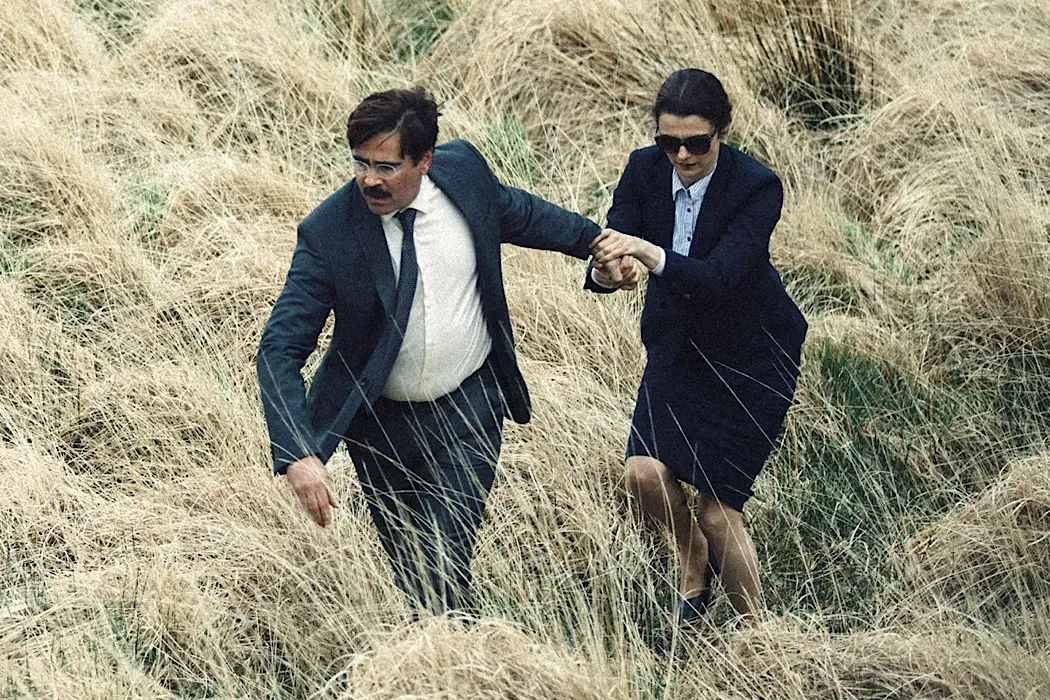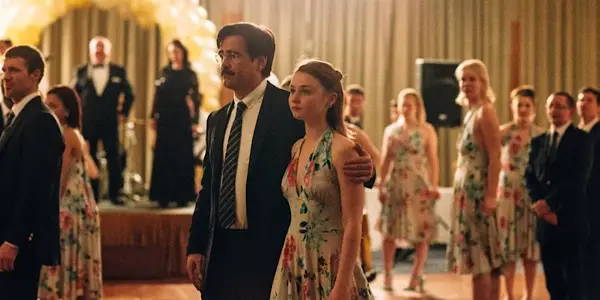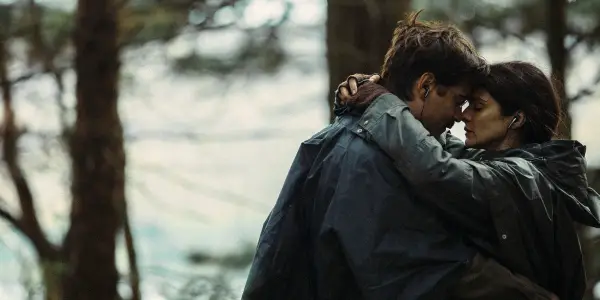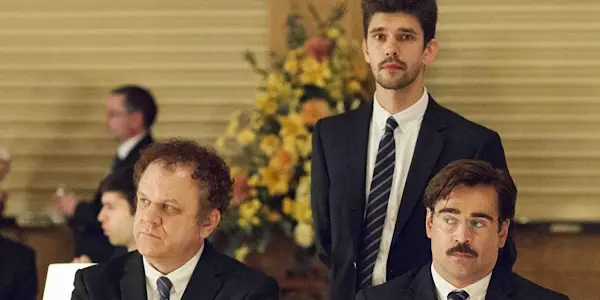Inquiring Minds: THE LOBSTER (2015)

Kristy Strouse is the Owner/Editor in Chief of Film Inquiry,…
This is the column that digs into the science fiction lover’s world, tackling some of the most complex and perplexing that content allows. Is it weird? Most likely. Do we love it? Yes! It’ll likely be thought-provoking, and potentially illuminating. Intriguing minds, unite for the weirdest Film Inquiry Column yet.
It’s February, the month of love, so why not take a gander at a romantic sci-fi film that fits into that perfect mold of oddity, comedy, and tenderness? Yes, I’m speaking of Yorgos Lanthimos‘ The Lobster.
I am a lover of a romance that resides in perplexity and abnormality. If you can find a genuine connection within, you’re winning.
The Harsh Absurdity
The Lobster takes a dystopian conceit that is as silly as it is absolutely terrifying. If you don’t have a mate you are turned into an animal. If you run you’re hunted.

David (Colin Farrell) has recently been dumped by his wife for someone else and due to the law in this strangely alternate existence, he’s required to find another mate, or… he will be turned into an animal. David is brought to a facility (with his brother Peter as a dog) where singles stay with some strict rules and with an overarching intent in mind: find your partner in 45 days or become another animal in the wild. His choice: a lobster. You can also earn more days for each of the runaways of the program that are living outside that you catch. It is barbaric and animalistic, but the notion fits in with this bleak world.
When things don’t go as expected for David he’s forced on the run where he meets a group in the woods led by Lea Seydoux, with their own rules and expectations. There he also meets Rachel Weisz, and the two find something neither had been looking for.

Written by Yorgos Lanthimos and Efthimis Filippou, The Lobster hones itself like the largest of contradictions as it bewilders its audience and encourages you to feel the way these characters are inhibited from the hope that comes from choice and natural connection. Many of the characters try to cut corners out of fear, resorting to faking ailments or bad temperaments based on this notion of being “well matched” – a naivety created by a cruel system that almost aims for failure.
The Hilarity
The deadpan delivery is such a treat. It showcases one of Farrell‘s and Weisz’s best performances. Farrell in particular is stellar, subtle but amazingly effective. His emotions are as tucked away as anyone else but the corners peel back at just the right times.
The supporting cast is also quite phenomenal, including but not limited to: Olivia Colman, Ben Whishaw, Lea Seydoux, John C. Reilly, and Rachel Weisz (who also narrates).
Yorgos Lanthimos is a master when it comes to conferring a semblance of depth and dissociation. There’s a level of talent that melds these in such a way that a film like The Lobster (or any of his others) feels surreal but also very honest. He is able to bring us a world that lives within a preposterous setting but thrives in the tragedy that confines these characters and the humor and heart that makes them soar. The idiosyncratic sensibilities of his films are always a compelling gift to unwrap.
It’s such a rarity to be truly original and that’s what The Lobster is. Even the names of most of the characters are non-descript: the limping man, the short-sighted woman, and the Loner Leader. The detail that is put into making this film seem obtuse and obscure is quite genius.

The music by Johnnie Burn is unique, often feeling like some ominous countdown or a quirky dance that you do alone when you think no one is watching. With the script, we have a solid and creative base for the dry delivery and expressionless body language to build upon. This is a quirky kind of humor and I know it’s not for everyone, but when it hits it really does. It’s both intelligent and surprising. I like my humor clever, and The Lobster excels.
The Heart
The disturbing elements are effective (one scene in particular) but so are the demonstrations of compassion. The emotion and heart embedded within the offbeat story comes in waves and often are more natural than the hollowed characters we see in a lot of romances. It doesn’t rely on tropes or cater to audience expectations.
It’s packaged as a science fiction film primarily because of its unusual futuristic premise which is always glaring, but it’s also a curtsy to love. I think some may be tested but for those who can settle in you’ll find a lot of heart, and at home in this peculiar tale.
Conclusion: The Lobster
The Lobster is imaginative, and unlike some other movies, you’ll see (even Lanthimos‘ others) it is comfortable in its profound offbeat bones. With each watch, I discover more to love, and there’s a lot behind the stony facades. It confounds and reverberates; The Lobster sings a singularly eccentric tune.
Does content like this matter to you?
Become a Member and support film journalism. Unlock access to all of Film Inquiry`s great articles. Join a community of like-minded readers who are passionate about cinema - get access to our private members Network, give back to independent filmmakers, and more.
Kristy Strouse is the Owner/Editor in Chief of Film Inquiry, writer, podcaster, and all around film and TV fanatic. She's also VP of Genomic Operations at Katch Data and is a member of The Online Association of Female Film Critics and The Hollywood Creative Alliance. She also has a horror website: Wonderfully Weird & Horrifying.












